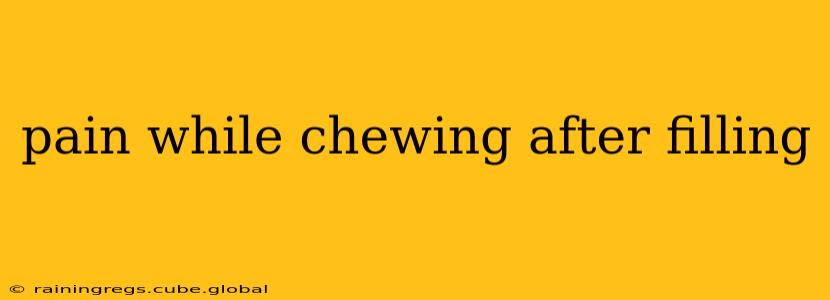Experiencing pain while chewing after getting a filling is unfortunately a common issue. While it's often temporary and resolves on its own, persistent pain can signal a more serious problem. This comprehensive guide will explore the various reasons why you might feel pain after a filling, how to address it, and steps to prevent future occurrences.
Why Does My Tooth Hurt After a Filling?
This is a question many dental patients ask. Several factors can contribute to post-filling discomfort:
-
Irritation of the tooth's nerve: Even with meticulous care, the filling procedure can sometimes irritate the tooth's pulp (the inner nerve). This irritation often manifests as sensitivity to temperature changes (hot or cold) or pressure (chewing). This is usually temporary, but persistent pain warrants a call to your dentist.
-
High filling: If the filling is placed too high, it can cause the tooth to make contact with opposing teeth prematurely during chewing, leading to discomfort and pain. This is a common cause that is easily remedied by your dentist.
-
Infection: In some cases, bacteria can enter the tooth during the filling procedure or afterwards, leading to an infection. Symptoms of an infection can include severe, throbbing pain, swelling, and possibly even fever. This requires immediate dental attention.
-
Cracked tooth: Pre-existing cracks or fractures in the tooth can worsen during the filling process or become more noticeable afterward, causing pain. A cracked tooth requires professional assessment and treatment.
What If I Have Sensitivity to Hot and Cold After a Filling?
Sensitivity to hot and cold is a very common experience after a filling, often resolving within a few days or weeks as the tooth adjusts. However, if the sensitivity is severe or persistent, contact your dentist. They may recommend:
-
Desensitizing toothpaste: These toothpastes contain ingredients like potassium nitrate or strontium chloride that help block the nerve signals that cause sensitivity.
-
Fluoride treatments: Fluoride strengthens tooth enamel and can reduce sensitivity.
-
Dental bonding: In some cases, additional bonding may be applied to further protect the tooth and reduce sensitivity.
Is Pain While Chewing After a Filling Normal?
Mild discomfort or pressure sensitivity for a few days after a filling is considered normal. However, sharp, intense, or persistent pain is not normal and requires a follow-up appointment with your dentist. Don't ignore the pain; early intervention is key to preventing more significant problems.
When Should I Call My Dentist About Post-Filling Pain?
You should contact your dentist immediately if you experience:
- Severe pain: Pain that is intense, throbbing, or interferes with your ability to eat or sleep.
- Swelling: Swelling around the tooth or jaw.
- Fever: A high temperature can indicate an infection.
- Persistent pain: Pain that lasts for more than a week or two, or that worsens over time.
How Can I Prevent Pain After a Filling?
While some discomfort is unavoidable, you can take steps to minimize the risk of post-filling pain:
- Choose a reputable dentist: Selecting a skilled and experienced dentist is crucial.
- Proper oral hygiene: Maintain excellent oral hygiene by brushing and flossing regularly.
- Avoid biting on hard objects: Avoid chewing on hard candy, ice, or excessively crunchy foods until your tooth feels completely normal.
- Follow your dentist's instructions: Carefully follow all post-procedure instructions provided by your dentist.
Can a Filling Cause a Toothache?
Yes, a poorly placed filling, an infection under the filling, or an existing crack exacerbated by the filling process can absolutely cause a toothache. Therefore, proper placement and diligent aftercare are crucial.
By understanding the potential causes of pain after a filling and knowing when to seek professional help, you can ensure your dental health and alleviate any discomfort. Remember, prevention and prompt attention are key to maintaining a healthy, pain-free smile.
